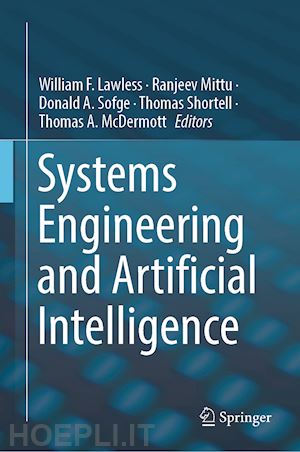
Questo prodotto usufruisce delle SPEDIZIONI GRATIS
selezionando l'opzione Corriere Veloce in fase di ordine.
Pagabile anche con Carta della cultura giovani e del merito, 18App Bonus Cultura e Carta del Docente
This book provides a broad overview of the benefits from a Systems Engineering design philosophy in architecting complex systems composed of artificial intelligence (AI), machine learning (ML) and humans situated in chaotic environments. The major topics include emergence, verification and validation of systems using AI/ML and human systems integration to develop robust and effective human-machine teams—where the machines may have varying degrees of autonomy due to the sophistication of their embedded AI/ML. The chapters not only describe what has been learned, but also raise questions that must be answered to further advance the general Science of Autonomy.
The science of how humans and machines operate as a team requires insights from, among others, disciplines such as the social sciences, national and international jurisprudence, ethics and policy, and sociology and psychology. The social sciences inform how context is constructed, how trust is affected when humans and machines depend upon each other and how human-machine teams need a shared language of explanation. National and international jurisprudence determine legal responsibilities of non-trivial human-machine failures, ethical standards shape global policy, and sociology provides a basis for understanding team norms across cultures. Insights from psychology may help us to understand the negative impact on humans if AI/ML based machines begin to outperform their human teammates and consequently diminish their value or importance. This book invites professionals and the curious alike to witness a new frontier open as the Science of Autonomy emerges.Ranjeev Mittu is the Branch Head for the Information Management and Decision Architectures Branch within the Information Technology Division at the U.S. Naval Research Laboratory. The research within the branch is focused on visual analytics and augmented reality, immersive simulations, intelligent decision support applications, distributed systems and enterprise and service oriented architectures.
Donald A. Sofge is a Computer Scientist with the Naval Research Laboratory, Washington, DC, USA, where he leads the Distributed Autonomous Systems Group. He has extensive expertise in the application of artificial intelligence, machine learning, machine vision (and other forms of artificial perception), planning and control theory to robotic systems.
Thomas Shortell is a Systems Engineer at Lockheed Martin. He has been awarded the PhD degree by Drexel University.
Tom McDermott is a leader, educator, and innovator in multiple technology fields. He currently serves as Deputy Director of the Systems Engineering Research Center at Stevens Institute of Technology in Hoboken, NJ, as well as a consultant specializing in strategic planning for uncertain environments. He serves as Director of Strategic Integration on the Board of the International Council on Systems Engineering.











Il sito utilizza cookie ed altri strumenti di tracciamento che raccolgono informazioni dal dispositivo dell’utente. Oltre ai cookie tecnici ed analitici aggregati, strettamente necessari per il funzionamento di questo sito web, previo consenso dell’utente possono essere installati cookie di profilazione e marketing e cookie dei social media. Cliccando su “Accetto tutti i cookie” saranno attivate tutte le categorie di cookie. Per accettare solo deterninate categorie di cookie, cliccare invece su “Impostazioni cookie”. Chiudendo il banner o continuando a navigare saranno installati solo cookie tecnici. Per maggiori dettagli, consultare la Cookie Policy.